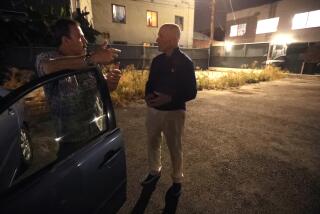Homeless Woman’s Relatives Show Up to Lend Support
- Share via
The case of a homeless woman challenging Buena Park’s anti-camping ordinance took a twist Wednesday as her long-estranged family unexpectedly showed up for an emotional reunion.
It was a good day in court for Diane Grue, who has been homeless for 10 years. Not only did her family arrive just as she took her place at the defense table, the judge warned prosecutors he was on the verge of telling jurors they should find her not guilty.
Whether or not Grue ultimately wins at trial, her unusual decision to take her case to a jury will have lasting effects: That’s how her family found her.
“I knew Grandma had some tough times, but I had no idea she had been on the street all these years,” said a granddaughter, Charlene O’Brien, 28, of Garden Grove.
O’Brien read about Grue in the newspaper and called her mother, Cherle Johnson of Victorville, early Wednesday morning.
“We’ve got to help Grandma,” O’Brien told Johnson, Grue’s former daughter-in-law.
The two hurried to Superior Court in Fullerton, where Grue is being tried.
O’Brien brought along her 5-month-old son, Michael. Grue hadn’t known she had great-grandchildren. She learned that O’Brien also has an 8-year-old daughter.
Grue, 66, had lost touch with her family after the 1989 death of her son, Danny, in an accident. Danny Grue and Johnson had divorced earlier and Diane Grue, who went into a depression after his death, eventually lost her job and began living part-time on the streets.
Grue arrived in court Wednesday out of breath. She had taken a bus to get there. She had just sat down at the defense table when Johnson entered the courtroom with the bailiff, who tapped Grue on the shoulder.
The elderly woman turned, looked at her former daughter-in-law and said, “Oh, my God!”
The two women hugged. Johnson led Grue out to the hallway to meet her extended family.
She also immediately offered her former mother-in-law a home.
“You come live with me,” said Johnson, 46. “We’ve got plenty of room.”
But after the initial hugs and exclamations, Grue was reserved with her family. She declined to hold her great-grandson. She said she wanted to get through her current troubles before thinking about the future.
Since losing track of her family, Grue has lived the first half of each month in cheap motels, using her Social Security check. The rest of the time she lives on the streets.
Buena Park has been her base for several reasons: She has a $30-a-month storage locker there where she keeps her possessions, and there is a church nearby where she can get food and take showers.
On Nov. 25, Grue and five others were arrested for camping near the railroad tracks just east of Stanton Avenue in Buena Park. The others were allowed to pay fines, but City Prosecutor Greg Palmer insisted on a 15-day jail sentence for Grue because she was a repeat offender, arrested six times in two years.
She decided to fight.
After the excitement over the reunion died down Wednesday, her attorney, Jon Alexander, produced a letter from Union Pacific Railroad Co. showing that the encampment where Grue was arrested is on private property, not public property. Alexander had received the information just the night before, and told the court about it moments before the jury was expecting to hear closing arguments in the weeklong trial.
The information makes a major difference in one of the two counts against Grue--possessing camping paraphernalia on public property. But Palmer argued that it makes no difference on the main count, violation of a city ordinance against camping in an area of public access.
But Judge James Marion wasn’t buying it. Although Palmer insisted that he has carefully avoided during trial calling the arrest site public property, the judge said tersely that Palmer had certainly led everyone to believe that that was what he meant.
“If Mr. Alexander’s evidence is true, then I think I’m going to have to instruct the jurors that if they find it was private property, then Miss Grue is not guilty.”
Palmer argued that if Grue wins the case, every homeless person in Orange County would think it’s permissible to set up camp near the railroad tracks.
The case continues today.
More to Read
Sign up for Essential California
The most important California stories and recommendations in your inbox every morning.
You may occasionally receive promotional content from the Los Angeles Times.













